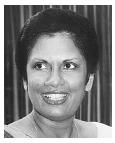SRI LANKA
Chandrika Bandaranaike Kumaratunga
President

(pronounced "chan-DREE-ka bon-dar-a-NAH-ee-kee koo-mar-ah-TUNG-ah")
"The fundamental obstacle to increased foreign investment is Sri Lanka's costly and prolonged ethnic conflict."
The Democratic Socialist Republic of Sri Lanka (formerly called Ceylon), is a teardrop-shaped island country in the Indian Ocean, situated off the southeastern coast of India. The Maldive Islands lie to its west. It has an area of about 65,610 sq km (25,332 sq mi). Major cities include Colombo, the capital, Dehiwala-Mount Lavinia, Jaffna, and Kandy.
The island had a estimated population of 19.5 million in2002. Official languages are Sinhala and Tamil, but English is also recognized as a national language. Since independence, one of the constant issues bedeviling Sri Lankan life has been ethnic conflict. Almost 74% of the population is Sinhalese. Tamils form about 18%, Muslims about 7%, and smaller groups such as the Burghers (people of Eurasian descent), Malays, and Veddah aborigines are also to be found in the country. About 70% of the population is Buddhist, but Hinduism, Islam and Christianity are also followed by smaller groups of the population. The Tamils themselves are divided into two groups: Sri Lankan Tamils, who have lived in the country for centuries, and Indian Tamils who were brought by the British colonizers as plantation laborers in the nineteenth century. Most of the ethnic conflict has been between the Sinhalese and the Tamils, particularly the Sri Lankan Tamils.
The per capita gross domestic product (GDP) was estimated at us$3,250 in 2001. The unit of currency is the Sri Lankan rupee . The Sri Lankan economy is heavily dependent upon agriculture, which contributes about a 21% of the country's GDP and employs about 44% of the labor force; the economy has diversified somewhat, with industry and services comprising about 19% and 60% of GDP respectively. Attempts have been made to boost the tourism and banking sectors. Textiles and clothing are the most important sources of foreign exchange, but traditional exports such as tea, rubber, and coconuts form over 20% of export earnings. Sri Lanka's forest cover has decreased drastically due to illegal logging, dam construction, road building, and land-clearing for cash crops. Torrential rains in May 2003 caused massive floods and mud slides in deforested areas, killing 256 people and destroying over 25,000 homes.
ADDRESS
Office of the President
Republic Square
Colombo 1, Sri Lanka
Comment about this article, ask questions, or add new information about this topic: